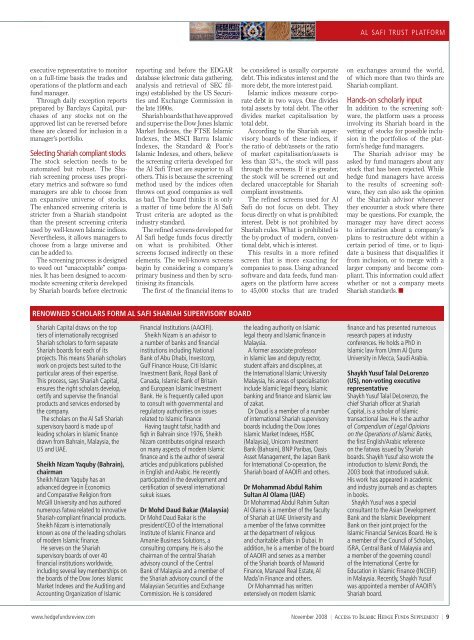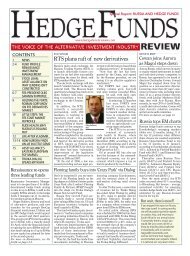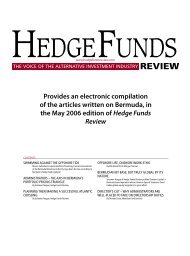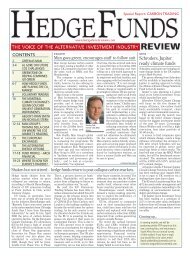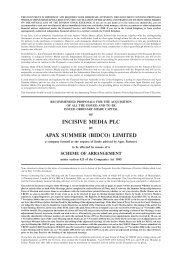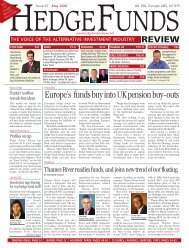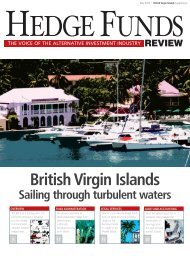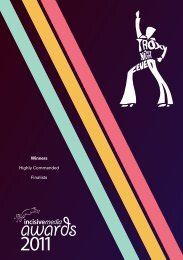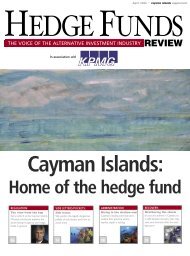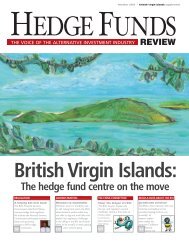Access to Islamic Hedge Funds - Incisive Media
Access to Islamic Hedge Funds - Incisive Media
Access to Islamic Hedge Funds - Incisive Media
Create successful ePaper yourself
Turn your PDF publications into a flip-book with our unique Google optimized e-Paper software.
al safi trust platform<br />
executive representative <strong>to</strong> moni<strong>to</strong>r<br />
on a full-time basis the trades and<br />
operations of the platform and each<br />
fund manager.<br />
Through daily exception reports<br />
prepared by Barclays Capital, purchases<br />
of any s<strong>to</strong>cks not on the<br />
approved list can be reversed before<br />
these are cleared for inclusion in a<br />
manager’s portfolio.<br />
Selecting Shariah compliant s<strong>to</strong>cks<br />
The s<strong>to</strong>ck selection needs <strong>to</strong> be<br />
au<strong>to</strong>mated but robust. The Shariah<br />
screening process uses proprietary<br />
metrics and software so fund<br />
managers are able <strong>to</strong> choose from<br />
an expansive universe of s<strong>to</strong>cks.<br />
The enhanced screening criteria is<br />
stricter from a Shariah standpoint<br />
than the present screening criteria<br />
used by well-known <strong>Islamic</strong> indices.<br />
AD<br />
Nevertheless, it allows managers <strong>to</strong><br />
choose from a large universe and<br />
can be added <strong>to</strong>.<br />
The screening process is designed<br />
<strong>to</strong> weed out “unacceptable” companies.<br />
It has been designed <strong>to</strong> accommodate<br />
screening criteria developed<br />
by Shariah boards before electronic<br />
reporting and before the EDGAR<br />
database (electronic data gathering,<br />
analysis and retrieval of SEC filings)<br />
established by the US Securities<br />
and Exchange Commission in<br />
the late 1990s.<br />
Shariah boards that have approved<br />
and supervise the Dow Jones <strong>Islamic</strong><br />
Market Indexes, the FTSE <strong>Islamic</strong><br />
Indexes, the MSCI Barra <strong>Islamic</strong><br />
Indexes, the Standard & Poor’s<br />
<strong>Islamic</strong> Indexes, and others, believe<br />
the screening criteria developed for<br />
the Al Safi Trust are superior <strong>to</strong> all<br />
others. This is because the screening<br />
method used by the indices often<br />
throws out good companies as well<br />
as bad. The board thinks it is only<br />
a matter of time before the Al Safi<br />
Trust criteria are adopted as the<br />
industry standard.<br />
The refined screens developed for<br />
Al Safi hedge funds focus directly<br />
on what is prohibited. Other<br />
screens focused indirectly on these<br />
elements. The well-known screens<br />
begin by considering a company’s<br />
primary business and then by scrutinising<br />
its financials.<br />
The first of the financial items <strong>to</strong><br />
be considered is usually corporate<br />
debt. This indicates interest and the<br />
more debt, the more interest paid.<br />
<strong>Islamic</strong> indices measure corporate<br />
debt in two ways. One divides<br />
<strong>to</strong>tal assets by <strong>to</strong>tal debt. The other<br />
divides market capitalisation by<br />
<strong>to</strong>tal debt.<br />
According <strong>to</strong> the Shariah supervisory<br />
boards of these indices, if<br />
the ratio of debt/assets or the ratio<br />
of market capitalisation/assets is<br />
less than 33%, the s<strong>to</strong>ck will pass<br />
through the screens. If it is greater,<br />
the s<strong>to</strong>ck will be screened out and<br />
declared unacceptable for Shariah<br />
compliant investments.<br />
The refined screens used for Al<br />
Safi do not focus on debt. They<br />
focus directly on what is prohibited:<br />
interest. Debt is not prohibited by<br />
Shariah rules. What is prohibited is<br />
the by-product of modern, conventional<br />
debt, which is interest.<br />
This results in a more refined<br />
screen that is more exacting for<br />
companies <strong>to</strong> pass. Using advanced<br />
software and data feeds, fund managers<br />
on the platform have access<br />
<strong>to</strong> 45,000 s<strong>to</strong>cks that are traded<br />
on exchanges around the world,<br />
of which more than two thirds are<br />
Shariah compliant.<br />
Hands-on scholarly input<br />
In addition <strong>to</strong> the screening software,<br />
the platform uses a process<br />
involving its Shariah board in the<br />
vetting of s<strong>to</strong>cks for possible inclusion<br />
in the portfolios of the platform’s<br />
hedge fund managers.<br />
The Shariah advisor may be<br />
asked by fund managers about any<br />
s<strong>to</strong>ck that has been rejected. While<br />
hedge fund managers have access<br />
<strong>to</strong> the results of screening software,<br />
they can also ask the opinion<br />
of the Shariah advisor whenever<br />
they encounter a s<strong>to</strong>ck where there<br />
may be questions. For example, the<br />
manager may have direct access<br />
<strong>to</strong> information about a company’s<br />
plans <strong>to</strong> restructure debt within a<br />
certain period of time, or <strong>to</strong> liquidate<br />
a business that disqualifies it<br />
from inclusion, or <strong>to</strong> merge with a<br />
larger company and become compliant.<br />
This information could affect<br />
whether or not a company meets<br />
Shariah standards. n<br />
renowned scholars form al safi shariah supervisory board<br />
Shariah Capital draws on the <strong>to</strong>p<br />
tiers of internationally recognised<br />
Shariah scholars <strong>to</strong> form separate<br />
Shariah boards for each of its<br />
projects. This means Shariah scholars<br />
work on projects best suited <strong>to</strong> the<br />
particular areas of their expertise.<br />
This process, says Shariah Capital,<br />
ensures the right scholars develop,<br />
certify and supervise the financial<br />
products and services endorsed by<br />
the company.<br />
The scholars on the Al Safi Shariah<br />
supervisory baord is made up of<br />
leading scholars in <strong>Islamic</strong> finance<br />
drawn from Bahrain, Malaysia, the<br />
US and UAE.<br />
Sheikh Nizam Yaquby (Bahrain),<br />
chairman<br />
Sheikh Nizam Yaquby has an<br />
advanced degree in Economics<br />
and Comparative Religion from<br />
McGill University and has authored<br />
numerous fatwa related <strong>to</strong> innovative<br />
Shariah-compliant financial products.<br />
Sheikh Nizam is internationally<br />
known as one of the leading scholars<br />
of modern <strong>Islamic</strong> finance.<br />
He serves on the Shariah<br />
supervisory boards of over 40<br />
financial institutions worldwide,<br />
including several key memberships on<br />
the boards of the Dow Jones <strong>Islamic</strong><br />
Market Indexes and the Auditing and<br />
Accounting Organization of <strong>Islamic</strong><br />
Financial Institutions (AAOIFI).<br />
Sheikh Nizam is an advisor <strong>to</strong><br />
a number of banks and financial<br />
institutions including National<br />
Bank of Abu Dhabi, Investcorp,<br />
Gulf Finance House, Citi <strong>Islamic</strong><br />
Investment Bank, Royal Bank of<br />
Canada, <strong>Islamic</strong> Bank of Britain<br />
and European <strong>Islamic</strong> Investment<br />
Bank. He is frequently called upon<br />
<strong>to</strong> consult with governmental and<br />
regula<strong>to</strong>ry authorities on issues<br />
related <strong>to</strong> <strong>Islamic</strong> finance<br />
Having taught tafsir, hadith and<br />
fiqh in Bahrain since 1976, Sheikh<br />
Nizam contributes original research<br />
on many aspects of modern <strong>Islamic</strong><br />
finance and is the author of several<br />
articles and publications published<br />
in English and Arabic. He recently<br />
participated in the development and<br />
certification of several international<br />
sukuk issues.<br />
Dr Mohd Daud Bakar (Malaysia)<br />
Dr Mohd Daud Bakar is the<br />
president/CEO of the International<br />
Institute of <strong>Islamic</strong> Finance and<br />
Amanie Business Solutions, a<br />
consulting company. He is also the<br />
chairman of the central Shariah<br />
advisory council of the Central<br />
Bank of Malaysia and a member of<br />
the Shariah advisory council of the<br />
Malaysian Securities and Exchange<br />
Commission. He is considered<br />
the leading authority on <strong>Islamic</strong><br />
legal theory and <strong>Islamic</strong> finance in<br />
Malaysia.<br />
A former associate professor<br />
in <strong>Islamic</strong> law and deputy rec<strong>to</strong>r,<br />
student affairs and disciplines, at<br />
the International <strong>Islamic</strong> University<br />
Malaysia, his areas of specialisation<br />
include <strong>Islamic</strong> legal theory, <strong>Islamic</strong><br />
banking and finance and <strong>Islamic</strong> law<br />
of zakat.<br />
Dr Daud is a member of a number<br />
of international Shariah supervisory<br />
boards including the Dow Jones<br />
<strong>Islamic</strong> Market Indexes, HSBC<br />
(Malaysia), Unicorn Investment<br />
Bank (Bahrain), BNP Paribas, Oasis<br />
Asset Management, the Japan Bank<br />
for International Co-operation, the<br />
Shariah board of AAOIFI and others.<br />
Dr Mohammad Abdul Rahim<br />
Sultan Al Olama (UAE)<br />
Dr Mohammad Abdul Rahim Sultan<br />
Al Olama is a member of the faculty<br />
of Shariah at UAE University and<br />
a member of the fatwa committee<br />
at the department of religious<br />
and charitable affairs in Dubai. In<br />
addition, he is a member of the board<br />
of AAOIFI and serves as a member<br />
of the Shariah boards of Mawarid<br />
Finance, Manazel Real Estate, Al<br />
Mada’in Finance and others.<br />
Dr Mohammad has written<br />
extensively on modern <strong>Islamic</strong><br />
finance and has presented numerous<br />
research papers at industry<br />
conferences. He holds a PhD in<br />
<strong>Islamic</strong> law from Umm Al Qurra<br />
University in Mecca, Saudi Arabia.<br />
Shaykh Yusuf Talal DeLorenzo<br />
(US), non-voting executive<br />
representative<br />
Shaykh Yusuf Talal DeLorenzo, the<br />
chief Shariah officer at Shariah<br />
Capital, is a scholar of <strong>Islamic</strong><br />
transactional law. He is the author<br />
of Compendium of Legal Opinions<br />
on the Operations of <strong>Islamic</strong> Banks,<br />
the first English/Arabic reference<br />
on the fatwas issued by Shariah<br />
boards. Shaykh Yusuf also wrote the<br />
introduction <strong>to</strong> <strong>Islamic</strong> Bonds, the<br />
2003 book that introduced sukuk.<br />
His work has appeared in academic<br />
and industry journals and as chapters<br />
in books.<br />
Shaykh Yusuf was a special<br />
consultant <strong>to</strong> the Asian Development<br />
Bank and the <strong>Islamic</strong> Development<br />
Bank on their joint project for the<br />
<strong>Islamic</strong> Financial Services Board. He is<br />
a member of the Council of Scholars,<br />
ISRA, Central Bank of Malaysia and<br />
a member of the governing council<br />
of the International Centre for<br />
Education in <strong>Islamic</strong> Finance (INCEIF)<br />
in Malaysia. Recently, Shaykh Yusuf<br />
was appointed a member of AAOIFI’s<br />
Shariah board.<br />
www.hedgefundsreview.com<br />
November 2008 | <strong>Access</strong> <strong>to</strong> <strong>Islamic</strong> <strong>Hedge</strong> <strong>Funds</strong> Supplement |


